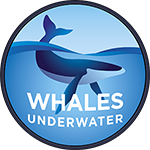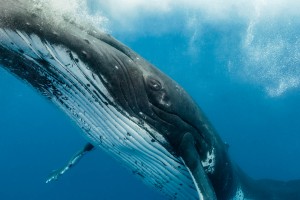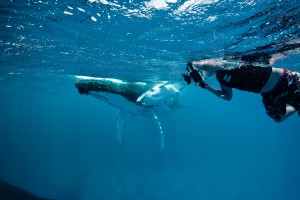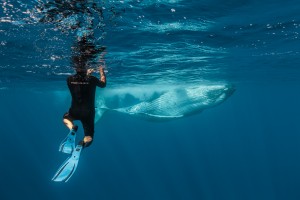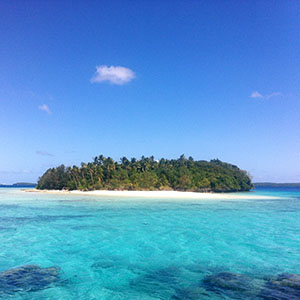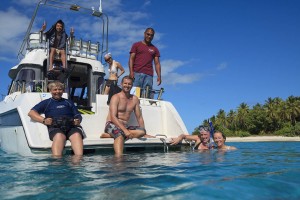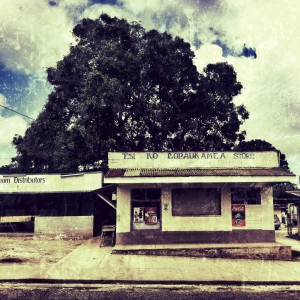To look a humpback whale in the eye is like no other wildlife experience on the planet– and a real privilege. Swimming with whales is by no means an easy task. We’re dealing with wild animals, in a very big ocean. We offer multi-day trips to ensure you have an unforgettable experience. With your patience and with faith in your skipper and guide’s experience, you’ll be rewarded with unmatched interactions. Darren Jew has been hosting whale swimming tours since 2001 and his experience as a photo-host in Tonga is unequaled. He’s hand-picked a fabulous team of skippers and guides to help bring you the best whale encounters possible.
Whale swimming in the Kingdom of Tonga is managed under Government Regulation. The Licensed Whale Swim Operator that we engage works under a set of strict Whale Watching Guidelines that have been formulated and refined over 20 years of humpback whale interactions in the waters around Vava’u. The Operator, your Skipper and your Guide are all legally responsible for ensuring interactions only take place in a manner that ensures whale swimming is an activity that is sustainable.
The art of swimming with and photographing whales
The opportunity to swim with humpback whales is a privilege. The act of swimming with humpback whales is an art. Every day is different on the water, and every encounter is unique. We swim with whales most days, but on some days this may only be briefly. Other days we swim for longer periods. We have known days where we have not swum with whales and that’s the reason we advocate multi-day trips– so that by the end of your tour we expect to have helped you experience a range of encounters with these incredible animals.
Whale swimming étiquette
We free-swim and snorkel with whales in Tonga, we don’t SCUBA dive with whales. Our groups stay close together and in the water your guide will be leading the encounter, in the best interests of the whales–and with your safety in mind. Most of your encounters will be when you’re floating on the surface of the water. On occasion your guide may allow you to leave the surface, but only under their strict direction. Your guide and skipper are the authority both on and in the water and you will be expected to respect the Whale Swimming Regulations, the decisions staff make, and their directions, at all times.
Weather and sea conditions
Of all the options available to us, we choose to swim with whales in Tonga’s Vava’u Group of islands. We do this because the the Vava’u Group, more than any other place, offers and incredible diversity of marine environments and the topography of the islands from reefs to low sand cays to high limestone islands can provide us with shelter and workable sea conditions all season long, in all but the most extreme weather conditions. Sitting north of the Topic of Capricorn, Vava’u has a maritime climate. Whale season is late Winter and early Spring. It can also be sunny, still and hot. There are also cloudy days. Sometimes it rains. The wind can blow, hard at times. We whale swim in all conditions, the whales don’t seem to mind about the weather. We look for whales over an area of approximately 300 square nautical miles. This is a mix of flat calm sheltered waterways, areas effected by wind chop and sometimes we are in open sea swells. The areas we search on particular days are determined by the previous day’s encounters, the weather and sea conditions and sometimes gut instinct. The clearest water is often (but not always) off-shore. Humpback whales visit Tonga in the Winter and Spring, not during the Summer cyclone season.
Group size
There will be a maximum of 8 guests on your boat and you will be split into two groups of 4. Each group takes alternate swims, and the group on the boat helps get cameras and people out of the water. This ensures efficient group changes, gives you a chance to catch your breath, to shoot surface activity, etc. We aim to ensure everyone has similar experiences across the week. The whale swimming regulations allow for 4 guests in the water, plus the accredited guide – total 5 people in the water.
Which tour dates do I choose?
August is cooler both on the boat and in the water. The water is often clearer early in the season. As far as whale activity goes, generally speaking (but no guarantees) August has larger groups of whales so the chance of “chasing pods/heat runs” is greater. In August the calves are younger and less used to swimmers. As the season progresses, the water warms up, sometimes visibility is effected by plankton blooms in the water, but the calves are older and more used to swimmers– chasing pod activity decreases but can still be encountered. Some guests choose to book back-to-back trips in order to be sure of experiencing all that the whales have to offer.
No-work Sundays
Tonga has a strong tradition of Sunday being a day of rest– in fact its against Tongan Law for all but an essential few operations to work on Sundays. Sunday lunch is not included in your tour, but we will provide you with information about the options that are available. So that means we have a lazy late breakfast, and it’s essentially a free day.
- Some people choose to visit one of the local Churches to enjoy the beautiful Tongan harmonies.
- Lunch at one of a couple local cafe’s that are permitted to open
- Laze around read a book
- Walk up to the highest point on the island, Mount Talau
- Wander the empty streets
- Work on your photographs
- Grab a lift to Talihau Beach for a snorkel
- Visit a local beach-front restaurant where you can laze under a palm tree with a cocktail and have a swim
